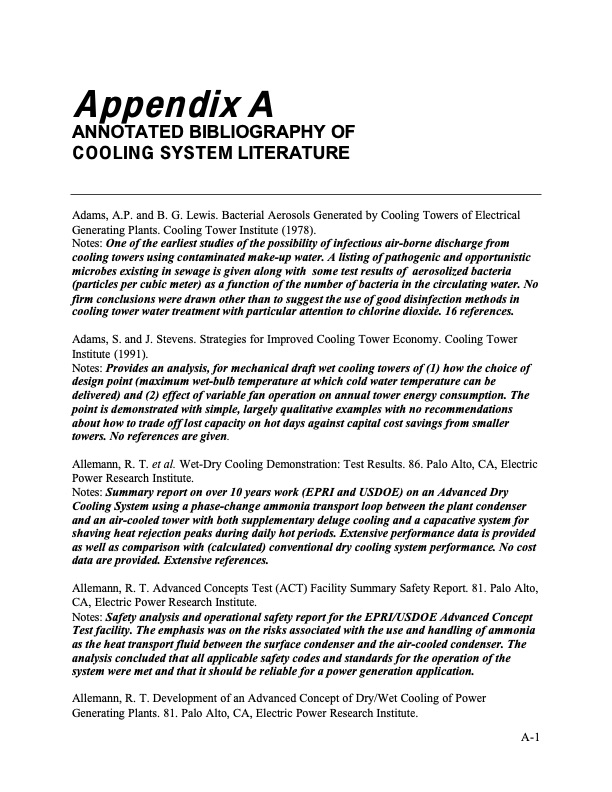
PDF Publication Title:
Text from PDF Page: 164
Appendix A ANNOTATED BIBLIOGRAPHY OF COOLING SYSTEM LITERATURE Adams, A.P. and B. G. Lewis. Bacterial Aerosols Generated by Cooling Towers of Electrical Generating Plants. Cooling Tower Institute (1978). Notes: One of the earliest studies of the possibility of infectious air-borne discharge from cooling towers using contaminated make-up water. A listing of pathogenic and opportunistic microbes existing in sewage is given along with some test results of aerosolized bacteria (particles per cubic meter) as a function of the number of bacteria in the circulating water. No firm conclusions were drawn other than to suggest the use of good disinfection methods in cooling tower water treatment with particular attention to chlorine dioxide. 16 references. Adams, S. and J. Stevens. Strategies for Improved Cooling Tower Economy. Cooling Tower Institute (1991). Notes: Provides an analysis, for mechanical draft wet cooling towers of (1) how the choice of design point (maximum wet-bulb temperature at which cold water temperature can be delivered) and (2) effect of variable fan operation on annual tower energy consumption. The point is demonstrated with simple, largely qualitative examples with no recommendations about how to trade off lost capacity on hot days against capital cost savings from smaller towers. No references are given. Allemann, R. T. et al. Wet-Dry Cooling Demonstration: Test Results. 86. Palo Alto, CA, Electric Power Research Institute. Notes: Summary report on over 10 years work (EPRI and USDOE) on an Advanced Dry Cooling System using a phase-change ammonia transport loop between the plant condenser and an air-cooled tower with both supplementary deluge cooling and a capacative system for shaving heat rejection peaks during daily hot periods. Extensive performance data is provided as well as comparison with (calculated) conventional dry cooling system performance. No cost data are provided. Extensive references. Allemann, R. T. Advanced Concepts Test (ACT) Facility Summary Safety Report. 81. Palo Alto, CA, Electric Power Research Institute. Notes: Safety analysis and operational safety report for the EPRI/USDOE Advanced Concept Test facility. The emphasis was on the risks associated with the use and handling of ammonia as the heat transport fluid between the surface condenser and the air-cooled condenser. The analysis concluded that all applicable safety codes and standards for the operation of the system were met and that it should be reliable for a power generation application. Allemann, R. T. Development of an Advanced Concept of Dry/Wet Cooling of Power Generating Plants. 81. Palo Alto, CA, Electric Power Research Institute. A-1PDF Image | Comparison of Alternate Cooling Technologies for California Power Plants Economic, Environmental and Other Tradeoffs

PDF Search Title:
Comparison of Alternate Cooling Technologies for California Power Plants Economic, Environmental and Other TradeoffsOriginal File Name Searched:
2002_07_09_500_02_079F.PDFDIY PDF Search: Google It | Yahoo | Bing
NFT (Non Fungible Token): Buy our tech, design, development or system NFT and become part of our tech NFT network... More Info
IT XR Project Redstone NFT Available for Sale: NFT for high tech turbine design with one part 3D printed counter-rotating energy turbine. Be part of the future with this NFT. Can be bought and sold but only one design NFT exists. Royalties go to the developer (Infinity) to keep enhancing design and applications... More Info
Infinity Turbine IT XR Project Redstone Design: NFT for sale... NFT for high tech turbine design with one part 3D printed counter-rotating energy turbine. Includes all rights to this turbine design, including license for Fluid Handling Block I and II for the turbine assembly and housing. The NFT includes the blueprints (cad/cam), revenue streams, and all future development of the IT XR Project Redstone... More Info
Infinity Turbine ROT Radial Outflow Turbine 24 Design and Worldwide Rights: NFT for sale... NFT for the ROT 24 energy turbine. Be part of the future with this NFT. This design can be bought and sold but only one design NFT exists. You may manufacture the unit, or get the revenues from its sale from Infinity Turbine. Royalties go to the developer (Infinity) to keep enhancing design and applications... More Info
Infinity Supercritical CO2 10 Liter Extractor Design and Worldwide Rights: The Infinity Supercritical 10L CO2 extractor is for botanical oil extraction, which is rich in terpenes and can produce shelf ready full spectrum oil. With over 5 years of development, this industry leader mature extractor machine has been sold since 2015 and is part of many profitable businesses. The process can also be used for electrowinning, e-waste recycling, and lithium battery recycling, gold mining electronic wastes, precious metals. CO2 can also be used in a reverse fuel cell with nafion to make a gas-to-liquids fuel, such as methanol, ethanol and butanol or ethylene. Supercritical CO2 has also been used for treating nafion to make it more effective catalyst. This NFT is for the purchase of worldwide rights which includes the design. More Info
NFT (Non Fungible Token): Buy our tech, design, development or system NFT and become part of our tech NFT network... More Info
Infinity Turbine Products: Special for this month, any plans are $10,000 for complete Cad/Cam blueprints. License is for one build. Try before you buy a production license. May pay by Bitcoin or other Crypto. Products Page... More Info
| CONTACT TEL: 608-238-6001 Email: greg@infinityturbine.com | RSS | AMP |